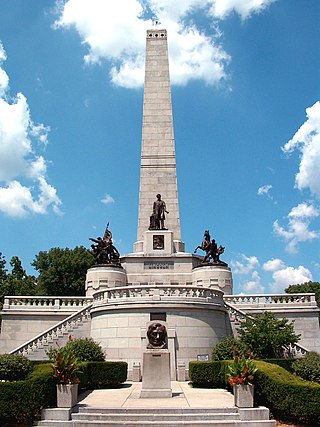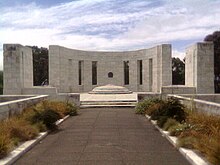
The prime minister of New Zealand is the head of government of New Zealand. The incumbent prime minister, Christopher Luxon, leader of the New Zealand National Party, took office on 27 November 2023.

Richard John Seddon was a New Zealand politician who served as the 15th premier of New Zealand from 1893 until his death. In office for thirteen years, he is to date New Zealand's longest-serving head of government.

Bunhill Fields is a former burial ground in central London, in the London Borough of Islington, just north of the City of London. What remains is about 1.6 hectares in extent and the bulk of the site is a public garden maintained by the City of London Corporation.

A mausoleum is an external free-standing building constructed as a monument enclosing the burial chamber of a deceased person or people. A mausoleum without the person's remains is called a cenotaph. A mausoleum may be considered a type of tomb, or the tomb may be considered to be within the mausoleum.

William Ferguson Massey was a politician who served as the 19th prime minister of New Zealand from May 1912 to May 1925. He was the founding leader of the Reform Party, New Zealand's second organised political party, from 1909 until his death.

The Lincoln Tomb is the final resting place of Abraham Lincoln, the 16th president of the United States; his wife Mary Todd Lincoln; and three of their four sons: Edward, William, and Thomas. It is located in Oak Ridge Cemetery in Springfield, Illinois.

Joseph Gordon Coates served as the 21st prime minister of New Zealand from 1925 to 1928. He was the third successive Reform prime minister since 1912.

The National War Memorial of New Zealand is located next to the Dominion Museum building on Buckle Street, in Wellington, the nation's capital. The war memorial was dedicated in 1932 on Anzac Day in commemoration of the First World War. It also officially remembers the New Zealanders who gave their lives in the South African War, World War II and the wars in Korea, Malaysia and Vietnam.
The Reform Government of New Zealand was the government of New Zealand from 1912 to 1928, led by the conservative Reform Party.

The Dominion Museum building on Mount Cook in Buckle Street Wellington completed in 1936 and superseded by Te Papa in 1998 was part of a war memorial complex including a Carillon and National War Memorial.

St Michael's Cemetery is a Catholic burial ground in the Rivelin Valley area of Sheffield, South Yorkshire, England. The cemetery stands on a steep hillside on the south side of Rivelin Valley Road at its junction with Rivelin Road and Hollins Lane.

Manchester Cenotaph is a war memorial in St Peter's Square, Manchester, England. Manchester was late in commissioning a First World War memorial compared with most British towns and cities; the city council did not convene a war memorial committee until 1922. The committee quickly achieved its target of raising £10,000 but finding a suitable location for the monument proved controversial. The preferred site in Albert Square would have required the removal and relocation of other statues and monuments, and was opposed by the city's artistic bodies. The next choice was Piccadilly Gardens, an area already identified for a possible art gallery and library; but in the interests of speedier delivery, the memorial committee settled on St Peter's Square. The area within the square had been had been purchased by the City Council in 1906, having been the site of the former St Peter's Church; whose sealed burial crypts remained with burials untouched and marked above ground by a memorial stone cross. Negotiations to remove these stalled so the construction of the cenotaph proceeded with the cross and burials in situ.

The English coastal city of Brighton and Hove, made up of the formerly separate Boroughs of Brighton and Hove in East Sussex, has a wide range of cemeteries throughout its urban area. Many were established in the mid-19th century, a time in which the Victorian "cult of death" encouraged extravagant, expensive memorials set in carefully cultivated landscapes which were even recommended as tourist attractions. Some of the largest, such as the Extra Mural Cemetery and the Brighton and Preston Cemetery, were set in particularly impressive natural landscapes. Brighton and Hove City Council, the local authority responsible for public services in the city, manages seven cemeteries, one of which also has the city's main crematorium. An eighth cemetery and a second crematorium are owned by a private company. Many cemeteries are full and no longer accept new burials. The council maintains administrative offices and a mortuary at the Woodvale Cemetery, and employs a coroner and support staff.

Parliament House, in Lambton Quay, Wellington, is the main building of the New Zealand Parliament Buildings. It contains the Parliament's debating chamber, speaker's office, visitors' centre, and committee rooms. It was built between 1914 and 1922, replacing an earlier building that burned down in 1907. Parliament started using the yet to be completed building from 1918. Parliament House was extensively earthquake strengthened and refurbished between 1991 and 1995. It is open for visitors almost every day of the year, and is one of Wellington's major visitor attractions. Parliament House is a Category 1 historic building registered by Heritage New Zealand.

Bolton Street Memorial Park, formerly known as Bolton Street Cemetery, is the oldest cemetery in Wellington, New Zealand. Dating back to 1840, many notable people are buried here. Situated in the suburb of Thorndon, the Wellington City Council's memorial trail number five covers the Bolton Street Memorial Park and visits notable graves, points of interest, lookouts and buildings.

Tamaki Drive is the coastal road which follows the contours of the Waitematā Harbour, Auckland, New Zealand. The road links the suburbs Ōrākei, Mission Bay, and Kohimarama ending in Saint Heliers providing easy access to the local beaches. Tamaki Drive was completed in 1932 and incorporates The Strand, Bice Esplanade and, what was once part of the old Kohimarama Road. It is also referred to as the Waterfront Road. Tamaki Drive is a flat road around 8 km long and popular with walkers, runners and roller skaters, and includes a dedicated cycle lane. Those travelling along Tamaki Drive can find scenic highlights and peaceful views across the harbour to the volcanic island Rangitoto. The cliffs backing onto Tamaki Drive are made of Waitematā Sandstone strata clothed in places with pōhutukawa. These trees seem to flower out of season, because these are actually Kermadec pōhutukawa with small distinctive roundish leaves.

Princess Royal Fortress, also known as Albany Forts, was a fortress on the northern shore of Atatürk entrance on Princess Royal Harbour on Mount Adelaide overlooking King George Sound in Albany, Western Australia. It now operates as a museum.

Petone Settlers Museum is a local history museum located in the Wellington Provincial Centennial Memorial, a historic building in Petone, Lower Hutt, New Zealand. The building was originally constructed to mark the Wellington province's centennial commemorations; the museum opened in the building in 1977. The building was extensively refurbished in 2016.

Torquay Cemetery, also known as Barton Road Cemetery is a burial ground located in the town of Torquay, Devon, England. The first interment, which took place in the Nonconformist section, was in 1852. The cemetery has been Grade II listed since 2002.

The Abel Tasman Monument is a memorial to the first recorded contact between Europeans—led by the Dutch explorer Abel Tasman—and Māori in New Zealand's Golden Bay on 18 and 19 December 1642. It was unveiled on the tercentenary of the encounter by the prime minister, several government ministers, and a Dutch delegation. The monument, originally referred to as the Abel Tasman Memorial, was designed by the architect Ernst Plischke as an abstracted sail, and consists of a large concrete monolith painted white. Located on a bluff at Tarakohe just east of Pōhara, the land for the monument was gifted by the Golden Bay Cement Company. The dignitaries opened the Abel Tasman National Park the following day and the area holding the monument is part of the national park. As was typical for the 1940s, the original inscription focused on the European experience only and overlooked the Māori perspective, demonstrating Western-centric systemic bias. The monument is one of New Zealand's National Memorials.




















